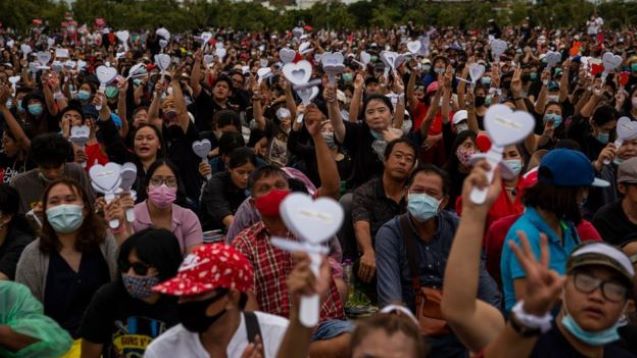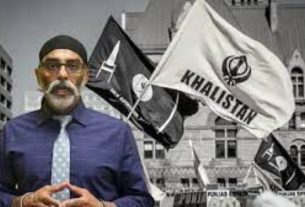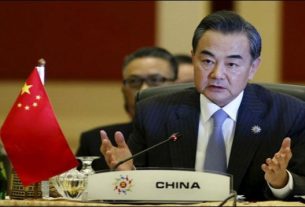BANGKOK — Pro-democracy protesters scuffled with riot police Thursday in Bangkok a few hundred meters from the venue for the Asia Pacific Economic Cooperation (APEC) summit, where leaders from the U.S., China and 19 other Pacific Rim nations are meeting.
Tens of thousands of police and army personnel deployed across the capital to discourage groups of demonstrators from fomenting a larger rally in protest of policies promoted by Prime Minister Prayuth Chan-o-cha.
Prayuth, who seized power in a 2014 military coup and was later installed as prime minister under a provisional post-coup constitution, has urged protesters to stand down during the summit.
“Don’t ruin our beautiful country; you must empathize with the security forces,” he told reporters this week after returning from a summit of the Association of Southeast Asian Nations in Cambodia.
Protesters demand PM step down
In the last few years, Prayuth has faced angry street protests — some of which have spilled into violence — alongside demands that he step down and call a general election.
In September, Thailand’s top court ruled that Prayuth can remain in power until at least next year’s elections, settling a legal dispute that echoes the country’s deep political divisions and dashing the opposition’s latest bid to remove the leader from office.
Tensions have risen in days leading up to the summit, with police chasing small groups of demonstrators through shopping malls, public transport and public areas where they have tried to hold flash mob protests or put up anti-Prayuth banners.
Summit decried as ‘festival of lies’
On Thursday, ranks of police with riot shields squeezed back several dozen angry protesters at a junction leading to the site of the summit, just hours before Chinese President Xi Jinping’s arrival.
Decrying Thailand’s hosting of the summit as a “festival of lies,” one protester read a statement on behalf of an activist’s consortium called Ratsadon — which roughly translates as “the people” — urging assembled leaders to snub their hosts.
“This warm but hypocritical welcome is merely a means for you … to certify the legitimacy of an ugly, tyrannical government,” he said.
Protesters spray painted riot police shields and held up placards calling for Prayuth to resign. They also demanded the release of political prisoners and reform of Thailand’s lese majeste law, which carries a sentence of up to 15 years in prison for insulting or defaming the royal family.
Convictions under that law have surged since massive pro-democracy rallies erupted in early 2020, rights advocates say.
Those rallies, which were led by young Thais and ultimately fizzled under police pressure and pandemic restrictions, nonetheless brought monarchical rule — and the state security apparatus that protects it — into the foreground of debate for the first time.
Protesters are now urging APEC summit delegates to reject a Thai government proposal known as the Bio-Circular Green Economy Model, an initiative that aims to drive green development but, critics say, favors big business over poor farmers.
“Prayuth is using APEC summit to legitimize these oppressive, exploitative schemes making enemies with farmers, laborers and the public,” said activist Passaravalee Thanakijvibulphol.
She is leading one of several protest groups targeting the summit area on Friday, although it remains to be seen how far police will allow the march to proceed.
Allegations of free speech suppression
Prayuth’s rule has drawn accusations of suppressing free speech while pushing resources and policies that favor monopolies that largely dominate Southeast Asia’s second-largest economy.
He has also been seen as favored by the powerful palace, headed by King Maha Vajiralongkorn.
Thailand’s pro-democracy camp says it is waiting for Prayuth to dissolve parliament — as he is expected to do in December — before reviving nationwide campaigns ahead of a general election anticipated early next year.
Some experts warn that Prayuth and his army allies are unlikely to hand over power to their rivals easily.
“The next election can’t just be about changing the face of the leader or the government,” said Parit Wacharasindhu, a strategy adviser of the opposition Move Forward Party. “It has to be about changing the status quo — the structure that this country hasn’t changed for far too long.”__VOANews





